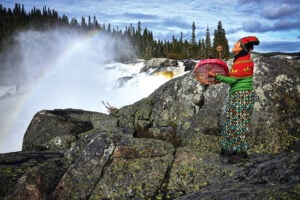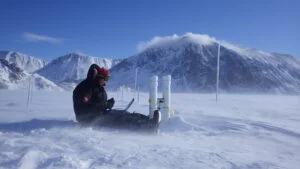David Boyd has built his career around a simple belief: that people, no matter where in the world they live, have the fundamental right to a safe, clean, healthy environment.
Boyd is an environmental lawyer and associate professor of law, policy and sustainability at the University of British Columbia. He was introduced to the connection between the environment and human rights some 30 years ago through the writings of David Suzuki and the work of Antonio Oposa, a litigator who in 1990 successfully sued the Philippines government on behalf of 43 children to stop deforestation around their village. Since then, he has written nine books on the subject of environmental rights and has been a leading voice in the movement to get Canada to recognize those rights.
Now two years into a three-year appointment as United Nations Special Rapporteur on Human Rights and the Environment, he is drawing on his optimism about our shared future to encourage countries around the world to recognize and protect their citizens’ environmental rights, and take action on the most urgent environmental issues of our time.
On the status of environmental rights around the world
There are now 110 countries where the right to live in a healthy environment is protected by their constitutions. Constitutions are important in two ways: one, they’re the highest form of law in every country, so citizens of those countries have the strongest possible form of protection for their right to a healthy environment. And in a non-legal sense, constitutions are also intended to represent our deepest and most cherished values. Overall, the evidence shows that countries that recognize the right to a healthy environment perform better on comprehensive indices of environmental protection, like the Yale Environmental Performance Index. They reduce air pollution more quickly, they reduce greenhouse gas emissions more quickly, and they have provided more rapid access to safe drinking water and adequate sanitation. That said, the level of impact of that constitutional recognition depends on a whole bunch of different factors. In a country like France, where you have strong governments, a strong court system and a functioning democracy, then the recognition of the right to a healthy environment can have quite powerful impacts. Whereas in a country like the Democratic Republic of Congo, where you essentially have a failed state, then upholding the right to a healthy environment — like all human rights — is going to be a much greater challenge.
On Canada’s journey toward enshrining environmental rights
Quebec was actually one of the pioneers in this field; they included the right to a healthy environment in their Environment Quality Act back in 1978. Ontario included it in their Environmental Bill of Rights in 1993. But those are the only two provinces that currently recognize the right to a healthy environment. The federal government does not recognize it. The David Suzuki Foundation and Ecojustice have been running what they call the Blue Dot Movement, which is intended to push governments to recognize the right to a healthy environment. There have been Private Members’ Bills on this subject dating back more than 10 years now that have never passed because it’s extremely difficult to get a Private Members’ Bill passed. But the federal government is currently deliberating about what steps it should take in terms of recognizing the right to a healthy environment, so I’m really, really hopeful that Canada will get with the program and catch up to all of the other countries that have already done so.
On how COVID-19 has changed the conversation around environmental rights
The interesting thing about COVID-19, which connects it to climate change and to the global emergency of biodiversity loss, is that all of these problems have the same root cause: our dysfunctional relationship with the natural world. We’re in the midst of the pandemic right now, so it’s really important for us to deal with this public health crisis, but we also have to invest in preparing for future pandemics. That means changing the way we deal with deforestation, changing our agricultural systems and what we eat, ensuring that our water, air and soil are clean. We’ve seen rollbacks in environmental protections in Ontario and Alberta as a result of the pandemic, but we should be strengthening our environmental laws and policies at this point in time, not weakening them.
On how rights can lead to action
Strengthening environmental laws is necessary from both an environmental and a health perspective. When you recognize the right to a safe, clean, healthy and sustainable environment, that can be a catalyst for all kinds of positive changes to address not only pollution, but also climate change and biodiversity loss. We’re seeing that in countries around the world where the connection between human rights and the environment is recognized. For example, in the Netherlands, they just closed down a coal-fired power plant because of a recognition that Dutch greenhouse gas emissions were too high and had to be reduced. And in Colombia, there was a court decision last year saying that deforestation in the portion of the Amazon rainforest that lies within Colombia was a violation of children’s right to a healthy environment.






